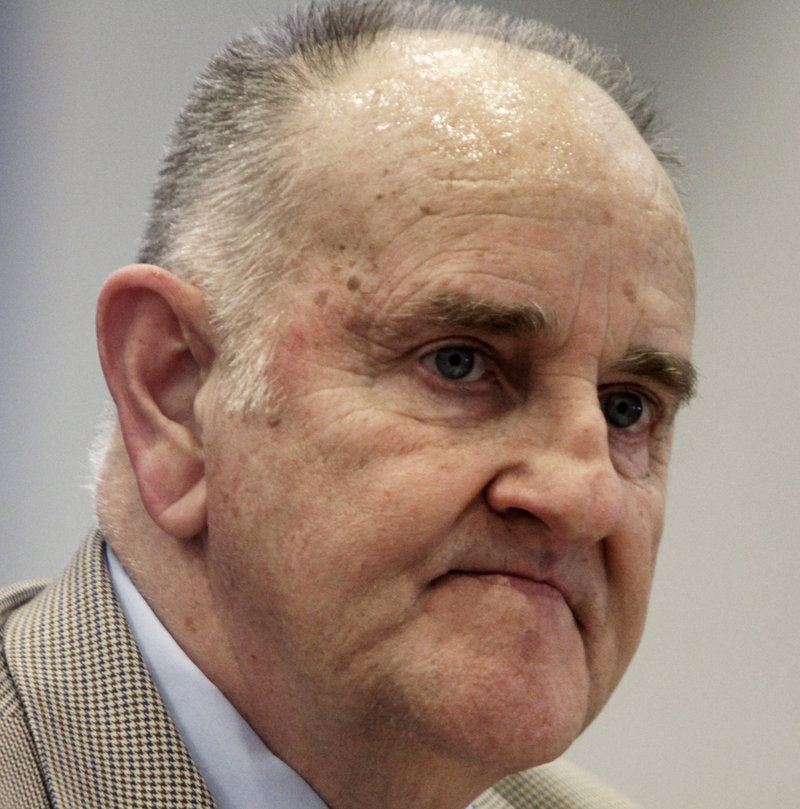AUGUSTA — Gov. Paul LePage moved one step closer Monday to ordering immediate cuts to the state budget.
But it is still unclear how the cuts will affect state programs and services.
LePage’s top budget officer formally recommended Monday that the governor quickly reduce state spending by $35 million in response to a projected drop in tax revenues.
“In the interest of attaining budget balance, it is important that we begin to curtail allotments as soon as possible,” Department of Administrative and Financial Services Commissioner Sawin Millett wrote in a letter to LePage Monday afternoon. Millett did not outline specific spending cuts or provide new details about the potential impact.
Now that LePage has received the formal recommendation, he may make a decision to reduce spending across the board — a so-called curtailment order — this week.
“The state of Maine is facing its own ‘fiscal cliff,'” LePage said in a written statement after receiving the letter. “Action must be taken to achieve a balanced budget, which the constitution requires. I have begun to assess the options regarding the best approach to reduce spending and I will do so in a thoughtful and meaningful way.”
Millett’s recommendation is a formal step toward a curtailment order, which would include equitable spending cuts in a variety of programs to balance the state budget. A curtailment order does not require any legislative approval.
LePage could instead ask the Legislature to approve a supplemental budget — a change to the state’s current spending plan — that focuses the cuts on specific programs or services. He already is expected to propose a supplemental budget in January because of a separate $100 million budget shortfall in the Health and Human Services Department.
While it’s not certain that LePage will issue the curtailment order because of the revenue decline, Adrienne Bennett, his spokeswoman, said Monday that it was likely.
Democratic leaders said they are committed to help balance the budget and that the revenue shortfall underscores the need to strengthen the state’s economy and get Mainers back to work.
“We stand ready to work (on the budget) but we still need more details,” said Senate Majority Leader Seth Goodall, of Richmond, in a written statement. “We are ready to roll up our sleeves to work on our state’s fiscal challenges. The fact is Maine, for the last two years, has been the only state in New England whose economy isn’t growing and the loss of revenue reflects this.”
House Democratic Majority leader Seth Berry, D-Bowdoinham, said the Legislature has to help get people back to work.
“We need more jobs in the short term and we need a blueprint for attracting and maintaining good-paying jobs in the future throughout all of Maine — not just in urban areas,” he said,
Bennett said the curtailment order is up to the governor, not the Legislature.
“This is executive authority and immediate action is required,” she said. “The governor is required by the (Maine) constitution to maintain a balanced budget. He needs to do this immediately.”
State law requires that the cuts be equitable, she said. Bennett pointed out that LePage’s predecessor, Democratic Gov. John Baldacci, issued curtailment orders totaling more than $180 million between 2008 and 2010.
A curtailment order would be an immediate and temporary fix, and the new Legislature will be able to take up a more targeted and permanent solution in January, Bennett said. “When the Legislature passes its plan, that’s when the curtailment will be lifted,” she said.
Last week the state’s revenue forecasting committee told the Legislature’s budget-writing committee that revenues were $35.5 million short for the fiscal year ending June 30.
Michael Allen, the state’s associate commissioner of tax policy, told lawmakers last week that the revenue shortfall is because of a convergence of events including the fiscal cliff negotiations in Congress and a Maine economy that is not growing as quickly as hoped. Allen said uncertainty surrounding the fiscal cliff — automatic tax increases and spending cuts that could take effect in January — is contributing to lower consumer spending and declines in corporate and individual income and sales taxes.
Democrats in the Legislature downplayed the fiscal cliff explanation on Monday. More than 70 percent of the shortfall in revenues — $26 million — was projected in April, before the latest round of partisan negotiations in Congress raised concerns about the cliff, they said.
Staff Writer John Richardson contributed to this report.
Steve Mistler — 620-7016
smistler@mainetoday.com
Send questions/comments to the editors.





Success. Please wait for the page to reload. If the page does not reload within 5 seconds, please refresh the page.
Enter your email and password to access comments.
Hi, to comment on stories you must . This profile is in addition to your subscription and website login.
Already have a commenting profile? .
Invalid username/password.
Please check your email to confirm and complete your registration.
Only subscribers are eligible to post comments. Please subscribe or login first for digital access. Here’s why.
Use the form below to reset your password. When you've submitted your account email, we will send an email with a reset code.